The Health bulletin [serial] - University of North Carolina at Chapel Hill
The Health bulletin [serial] - University of North Carolina at Chapel Hill
The Health bulletin [serial] - University of North Carolina at Chapel Hill
You also want an ePaper? Increase the reach of your titles
YUMPU automatically turns print PDFs into web optimized ePapers that Google loves.
;<br />
December, 1927 <strong>The</strong> <strong>Health</strong> Bulletin 21<br />
reaching new heights. Occasionallj' the<br />
lower branches, no longer giving nourishment<br />
to the tree, slough <strong>of</strong>f. We<br />
should not be ashamed to change ovir<br />
methods, r<strong>at</strong>her we should be ashamed<br />
never to do so. We should try new<br />
things, but should show common sense<br />
about it. <strong>The</strong> science which can point<br />
to its achievements against smallpox,<br />
malaria, yellow fever, diphtheria, typhoid<br />
and typhus fevers, tuberculosis<br />
and a score <strong>of</strong> other diseases, as well<br />
as to a rapid lengthening <strong>of</strong> human<br />
life, and especially to the saving <strong>of</strong><br />
vast numbers <strong>of</strong> infants from early<br />
de<strong>at</strong>h, need not be ashamed to acknowledge<br />
th<strong>at</strong> some experiments have<br />
failed ; neither should it hesit<strong>at</strong>e to admit<br />
th<strong>at</strong> we are still merely picking<br />
up pebbles on the shore <strong>of</strong> the sea<br />
<strong>of</strong> knowledge, and th<strong>at</strong> wh<strong>at</strong> is not<br />
known about maintaining and perfecting<br />
the health <strong>of</strong> mankind is far gre<strong>at</strong>er<br />
than wh<strong>at</strong> is known. <strong>The</strong> opiwrtunities<br />
for discovery are as gre<strong>at</strong> as before<br />
the days <strong>of</strong> Harvey, Pasteur and Lister.<br />
Discoveries While Pursuing Daily<br />
Duties<br />
"We are apt to think <strong>of</strong> science as<br />
concerned only with the microscope, the<br />
test tube and the chemical balance.<br />
It is my urgent desire to impress upon<br />
both laymen and pr<strong>of</strong>essional health<br />
workers th<strong>at</strong> some <strong>of</strong> the most valuable<br />
truths <strong>of</strong> sanitary science have<br />
been discovered in the field, <strong>at</strong> the<br />
bedside, or <strong>at</strong> the desk <strong>of</strong> the st<strong>at</strong>istician.<br />
Gre<strong>at</strong> as are the contributions <strong>of</strong><br />
the labor<strong>at</strong>ory, they must all be<br />
checked by observ<strong>at</strong>ions on human beings.<br />
<strong>The</strong>re is the gre<strong>at</strong>est need for<br />
scientific investig<strong>at</strong>ion by health <strong>of</strong>ficers<br />
and field workers. Such studies<br />
have borne splendid fruit in the past<br />
and will do so in the future.<br />
"It was by his study <strong>of</strong> his p<strong>at</strong>ients,<br />
r<strong>at</strong>her than by chemical tests, th<strong>at</strong><br />
Sir George Baker, in the ISth century,<br />
showed th<strong>at</strong> 'Devonshire co.ic' was the<br />
result <strong>of</strong> lead poisoning, due to the<br />
custom in th<strong>at</strong> part <strong>of</strong> England <strong>of</strong><br />
keeping cider in lead lined vessels.<br />
"Beriberi is a very serious disease <strong>of</strong><br />
the tropics affecting the nervous system.<br />
According to Sellards, the n<strong>at</strong>ure<br />
<strong>of</strong> the diseases was discovered in the<br />
following way. In 1890 Dr. Eijkman, a<br />
Dutch physician in Java, was studying<br />
another disease and was using chickens<br />
for his experiments. <strong>The</strong> chickens<br />
died so fast with paralysis th<strong>at</strong> he<br />
feared he would have to stop his work.<br />
Suddenly, they began to get better<br />
but after a time the same disease <strong>at</strong>tacked<br />
them again. Eijkman gave<br />
the boy who took care <strong>of</strong> the<br />
money to<br />
chickens to buy cheap unpolished rice<br />
for them, but the boy kept the money<br />
and begged nice white rice from the<br />
hospital steward. It was then th<strong>at</strong> the<br />
chickens died. <strong>The</strong> steward was away<br />
for a time and the boy had to buy unpolished<br />
rice. <strong>The</strong>n the chickens recovered.<br />
<strong>The</strong> chicken disease reminded<br />
Eijkman <strong>of</strong> beiiberi and he tried feeding<br />
unpolished rice to beriberi p<strong>at</strong>ients.<br />
<strong>The</strong>y too recovered. <strong>The</strong> iwlishing <strong>of</strong><br />
rice seemed to i-emove something, the<br />
lack <strong>of</strong> which caused beriberi in persons<br />
whose diet consisted chietly <strong>of</strong><br />
polished rice. This disease is now<br />
largely controlled, but best <strong>of</strong> all. Funk,<br />
while trying to learn the n<strong>at</strong>ure <strong>of</strong> this<br />
substance, laid the found<strong>at</strong>ion for the<br />
study <strong>of</strong> vitamins.<br />
"Austin Flint, with no knowledge <strong>of</strong><br />
germs, showed th<strong>at</strong> typhoid fever is<br />
spread by drinking w<strong>at</strong>er. At about the<br />
same time, Dr. John Snow, <strong>of</strong> London,<br />
traced cholera to the celebr<strong>at</strong>ed Broad<br />
Street Well. <strong>The</strong>se observ<strong>at</strong>ions have<br />
been <strong>of</strong> inestimable value to preventive<br />
medicine.<br />
"It was not in the labor<strong>at</strong>ory, but<br />
while going through the tenements <strong>of</strong> a<br />
New England mill village during the<br />
course <strong>of</strong> a typhoid fever outbreak,<br />
th<strong>at</strong> Sedgwick observed the transfer <strong>of</strong><br />
frtsh excretions from child to child,<br />
and recognized the imixtrtance <strong>of</strong> contact<br />
infection, a conception which has<br />
revolutionized our methods <strong>of</strong> handling<br />
contagious diseases.<br />
"It was Finlay's observ<strong>at</strong>ions on the<br />
surroundings <strong>of</strong> his yellow fever<br />
p<strong>at</strong>ients in Cuba which led to his suspicion<br />
th<strong>at</strong> a certain species <strong>of</strong> mosquito<br />
transmits this disease. While <strong>at</strong><br />
w-ork for the government trying to<br />
stamp out yellow fever in the South,<br />
Henry Carter observed th<strong>at</strong> after this<br />
disease is brought to a place, a certain<br />
number <strong>of</strong> the days must elapse before<br />
it begins to spread. <strong>The</strong>se two facts,<br />
brought to the <strong>at</strong>tention <strong>of</strong> our army<br />
< fficers, soon led to the complete solution<br />
<strong>of</strong> the problem and control <strong>of</strong> the<br />
disease."


![The Health bulletin [serial] - University of North Carolina at Chapel Hill](https://img.yumpu.com/33495252/379/500x640/the-health-bulletin-serial-university-of-north-carolina-at-chapel-hill.jpg)
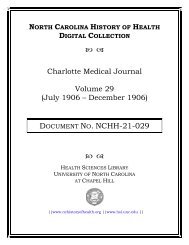
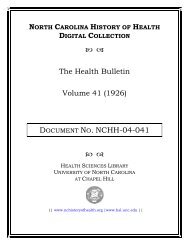
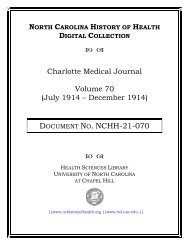
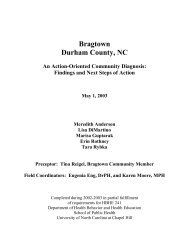
![Bulletin of the North Carolina Board of Health [serial] - University of ...](https://img.yumpu.com/48032016/1/153x260/bulletin-of-the-north-carolina-board-of-health-serial-university-of-.jpg?quality=85)
![The Health bulletin [serial] - University of North Carolina at Chapel Hill](https://img.yumpu.com/47603625/1/169x260/the-health-bulletin-serial-university-of-north-carolina-at-chapel-hill.jpg?quality=85)
![The Health bulletin [serial] - University of North Carolina at Chapel Hill](https://img.yumpu.com/47242858/1/169x260/the-health-bulletin-serial-university-of-north-carolina-at-chapel-hill.jpg?quality=85)
![The Health bulletin [serial] - University of North Carolina at Chapel Hill](https://img.yumpu.com/43204263/1/172x260/the-health-bulletin-serial-university-of-north-carolina-at-chapel-hill.jpg?quality=85)
![The Health bulletin [serial] - University of North Carolina at Chapel Hill](https://img.yumpu.com/41981074/1/163x260/the-health-bulletin-serial-university-of-north-carolina-at-chapel-hill.jpg?quality=85)
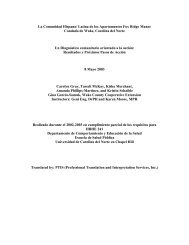
![The Health bulletin [serial] - University of North Carolina at Chapel Hill](https://img.yumpu.com/40912928/1/164x260/the-health-bulletin-serial-university-of-north-carolina-at-chapel-hill.jpg?quality=85)
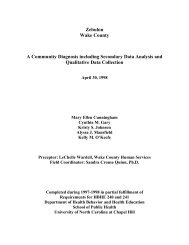
![The Health bulletin [serial] - University of North Carolina at Chapel Hill](https://img.yumpu.com/35643061/1/167x260/the-health-bulletin-serial-university-of-north-carolina-at-chapel-hill.jpg?quality=85)
![Biennial report of the North Carolina State Board of Health [serial]](https://img.yumpu.com/34024350/1/166x260/biennial-report-of-the-north-carolina-state-board-of-health-serial.jpg?quality=85)
